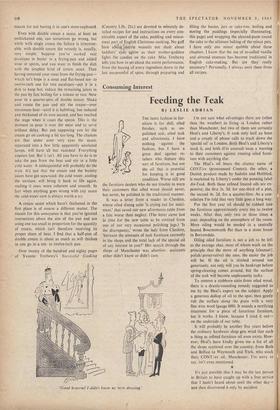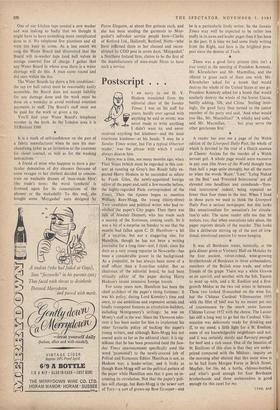Consuming Interest
Feeding the Teak
By LESLIE ADRIAN TkiE latest fashion in fur- niture is for dull, oiled finishes, such as un- polished oak, oiled teak and afrormosia. I have
nothing against the fashion, but I have a great deal against re- tailers who feature this sort of furniture, but not 4° the oil that is essential
o for keeping it in good
condition. Worse still are the furniture dealers who do not trouble to warn their customers that oiled wood should never, but never, be polished in the traditional manner.
It was a letter from a reader in Cheshire, whose oiled dining suite 'is crying out for nutri- ment,' that saved our new afrormosia table from a fate worse than neglect. (The letter came just in time for the new table to be omitted from one of our very occasional polishing jags.) 'Is the discrepancy,' wrote the lady from Cheshire, 'between the amounts of teak furniture currently in the shops and the total lack of the special oil of any interest to you?' Her search through the shops of Manchester was abortive: assistants either didn't know or didn't care.
'Good heavens! I didn't know we were dressing.'
I'm not sure what advantages there arc (other than the weather) in living in London rather than Manchester, but two of them are certainly Heal's and Liberty's. It took only half an hour and a couple of phone calls to track down the 'special oil' in London. Both Heal's and Liberty's stock it, and both (I'm assured) issue a warning to their customers against treating oiled furni- ture with anything else.
The Heal's oil bears the clumsy name of CONTlex (pronounced Contex); the other, a
Danish product made by Sadolin and Hollbled,
is marketed by Liberty's under the punning label An-Teak. Both these refined linseed oils are ex-
pensive; the first 3s. 3d. for one-third of a pint, the second 4s. 2d. for a quarter-litre. As a con- solation I'm told that very little goes a long way. For the first year oil should be rubbed into the furniture approximately every ten to twelve
weeks. After that, only two or three times a year, depending on the atmosphere of the room. More oiling would be needed in a centrally heated Bournemouth flat than in a stone house in Borrowdale.
Oiling oiled furniture is not a job to be left to the average char, most of whom work on the principle that the more of anything (cleanser f, polish/preservative) she uses, the easier the job will be. If the oil is sloshed around too generously, not only will you be bankrupt before spring-cleaning comes around, but the surface of the teak will become unpleasantly tacky.
To remove a stubborn stain from oiled wood, there is a drastic-sounding remedy suggested to me by the Heal's expert on the subject. Apply
a generous dollop of oil to the spot, then gently rub the surface along the grain with a very
fine wire wool (gauge 000). It sounds a terrifying treatment for a piece of luxurious furniture, but it works. I know, because I tried it out— on the underside of our table.
It will probably be another five years before the ordinary hardware shop gets wind that such a thing as refined furniture oil even exists. How- ever, Heal's have kindly given me a list of all the shops scattered over the country, from Bath and Belfast to Weymouth and York, who stock their CONT/ex oil. Manchester, I'm sorry to say, isn't even mentioned.
It's just possible that I may be the last person in Britain to have caught up with a free service that I hadn't heard about until the other day— and then discovered it only by accident. One of our kitchen taps needed a new washer and was leaking so badly that we thought it might have to have something more complicated done to it. We telephone five plumbers and all were too busy to come. As a last resort we rang the Water Board and discovered that the Board will re-washer taps (and ball valves in storage cisterns) free of charge. 1 gather that any Water Board in whose area there is a water shortage will do this. A man came round and did ours within the day.
The Water Boards lay down a few conditions: the tap (or ball valve) must be reasonably easily accessible, the Board does not accept liability for any damage done and the work must be done on a weekday to avoid weekend overtime payments to staff. The Board's staff must not be paid for the work or given a tip.
You'll find your Water Board's telephone number in the book. In the London area it is TERminus 3300.
*
It is a mark of self-confidence on the part of a fabric manufacturer when he uses his mer- chandising ticket as an invitation to the customer foi closer contact, as well as for the washing instructions.
A friend of mine who happens to have a par- ticular detestation of dry cleaners (because of some ravages to her clothes) decided to concen- trate on washable dresses of 'man-made fibre' (the trade's term: the word 'synthetic' is frowned upon for its connotations of the phoney or the makeshift). To this end, she bought some `Moygasher suits designed by Pierre Elegante, at about five guineas each, and she has been sending the garments to Moy- gashel's refresher service people here—Clarks of Retford Ltd., Hallcroft, Retford, Notts—who have returned them to her cleaned and recon- stituted by COD post in seven days. `Moygashel,' a Northern Ireland firm, claims to be the first of the manufacturers of man-made fibres to have such a service.















































 Previous page
Previous page